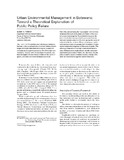Urban environmental management in Botswana:towards a theoretical explanation of public policy failure

View/
Date
2001Author
Toteng, E.N.
Publisher
Springer http://www.springerlink.com/index/05CM7XY4DJGUEUQL.pdfType
Published ArticleMetadata
Show full item recordAbstract
For the last three and half decades, Botswana has been widely acclaimed to be one of sub-Saharan Africa's longest and most stable liberal democracies, coupled with and sustained by a growing economy. One of the major contradictions, however, within this development scenario, has been the neglect of environmental problems in the country in general, and urban environmental issues in particular.
Part of the problem fueling the misconception of environmental issues in Botswana is the state's domination of the country's environmental agenda. This is linked to the power disjunction in decision-making and policy processes between state and nonstate actors over the most appropriate course of action to tackle the problems. Without adopting appropriate analytical frameworks, it is possible that the problem of urban environmental mismanagement in Botswana will persist. This article examines some of the major urban environmental issues in Botswana from neighborhood, citywide, and urban–rural interface perspectives. Further, the elite theory of public policy is used to explain constraints on policy change in the urban environmental management arena in Botswana
